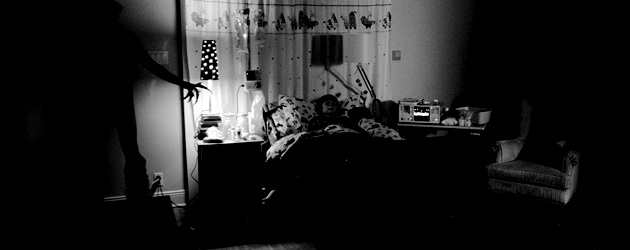
Horror movies tend to have big opening weekends and then drop-off substantially in box office returns by its second weekend. What bugs me is that it seems to be all the bad horror movies that seem to be victorious upon opening weekend. But if you look at quality horror films and even smart thrillers they tend to sag immediately despite strong reviews. The common movie fan’s reaction is to wait for DVD. This confounds me. Some of the best ones work like [black] magic on the big screen.
The most visually dynamic as well as potently dark horror movies of recent times is “Insidious” (it opened on April 1st), which is going to work much, much better on the big screen than frankly ever will on home video. There is something all-encompassing about it, as well as insurmountably large, that happens in a theater that will instead get miniaturized – even less in your face – at home. Small-screen shrinkage doesn’t overpower the senses, not even on your widescreen television. At the theater, you get lost in the dark with it. Hokum the story material surely is, but it has an alarming power to it that is unmistakable.
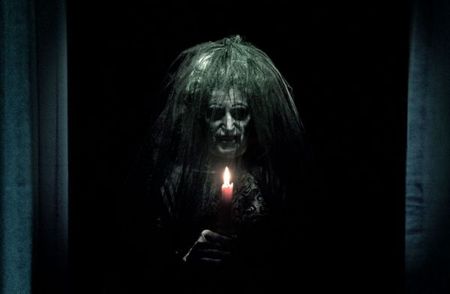 You might wonder, what’s insidious about “Insidious?” It’s the first cinematic vision of demons that truly gets into your head, that tickles your darkest horror receptors, in a mammoth-sized, can’t forget it way. More than “Poltergeist” (1982) and perhaps anything else, you really get a surrealist dream vision of the other dimension, the dimension of lost souls. What’s the use of any of this? To scare the stuffing out of you, that’s what. Maybe you thought you were above being scared anymore of anything.
You might wonder, what’s insidious about “Insidious?” It’s the first cinematic vision of demons that truly gets into your head, that tickles your darkest horror receptors, in a mammoth-sized, can’t forget it way. More than “Poltergeist” (1982) and perhaps anything else, you really get a surrealist dream vision of the other dimension, the dimension of lost souls. What’s the use of any of this? To scare the stuffing out of you, that’s what. Maybe you thought you were above being scared anymore of anything.
Last year’s “Splice” was a superior horror film with an intoxicating color palette, one that was often on the desaturated side. The visual design was as operatively calculated as the work of a brain surgeon. And when the sudden burst of blood hits the screen, it’s a punch in the face moment that doesn’t translate to the small screen. On the small screen, it’s entertaining, but it’s horror that shrinks to drama, the kind that doesn’t horrify you as much as interest you. Still effective though for horror lightweights.
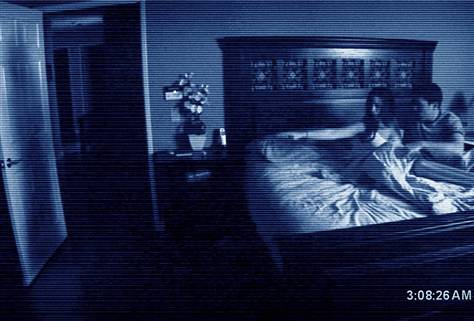 I would consider you unlucky if you missed “Paranormal Activity” (2009) on the big screen. For those that saw it a video who thought it was scary but not that big of a deal, well then, you missed something sinister that only a pitch-black theater and a big swollen enveloped wall of grainy image can give you. That’s a case where your eyes pop open searching for clues around a large frame. On home video, the eyes are less attuned and you wait for something to happen, more passively and with less involvement. Also, the wicked laughs are big when you’re in a theater surrounded by frightened people that are more frightened than you.
I would consider you unlucky if you missed “Paranormal Activity” (2009) on the big screen. For those that saw it a video who thought it was scary but not that big of a deal, well then, you missed something sinister that only a pitch-black theater and a big swollen enveloped wall of grainy image can give you. That’s a case where your eyes pop open searching for clues around a large frame. On home video, the eyes are less attuned and you wait for something to happen, more passively and with less involvement. Also, the wicked laughs are big when you’re in a theater surrounded by frightened people that are more frightened than you.
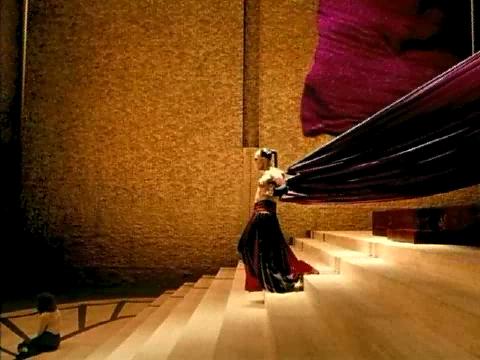 Likewise, the zombie horror of “28 Days Later” (2002) and its sequel “28 Weeks Later” (2007) had a run and hide frenzy to it that has an apocalyptic excitement to it, and I for one, prefer my apocalyptic thrill rides on the big screen. “The Ring” (2002) had a looming suck-in thrill about it, more cleverly designed and photographed that it has often been given credit for. Tarsem Singh’s “The Cell” (2000, pic right), among the most underrated horrors and general films ever, had a Salvador Dali-esque panorama on the big-screen that was truly astounding. In the film, Jennifer Lopez by experiment plunges into the subconscious mind of a captured serial killer to track the whereabouts of a kidnapped victim, and herself becomes dizzy by his disturbed psyche. “The Sixth Sense” (1999), the I See Dead People one that was a true blockbuster hit, simply had a spellbinding power on the big screen. “The Blair Witch Project” (1999), well gee, was pretty worthless after the cat was out of the bag.
Likewise, the zombie horror of “28 Days Later” (2002) and its sequel “28 Weeks Later” (2007) had a run and hide frenzy to it that has an apocalyptic excitement to it, and I for one, prefer my apocalyptic thrill rides on the big screen. “The Ring” (2002) had a looming suck-in thrill about it, more cleverly designed and photographed that it has often been given credit for. Tarsem Singh’s “The Cell” (2000, pic right), among the most underrated horrors and general films ever, had a Salvador Dali-esque panorama on the big-screen that was truly astounding. In the film, Jennifer Lopez by experiment plunges into the subconscious mind of a captured serial killer to track the whereabouts of a kidnapped victim, and herself becomes dizzy by his disturbed psyche. “The Sixth Sense” (1999), the I See Dead People one that was a true blockbuster hit, simply had a spellbinding power on the big screen. “The Blair Witch Project” (1999), well gee, was pretty worthless after the cat was out of the bag.
Forthright note: Although I was entertained enough to recommend “Scream 4” which opened this weekend, it’s one that can wait for DVD if you’re not big bones for the series in general.
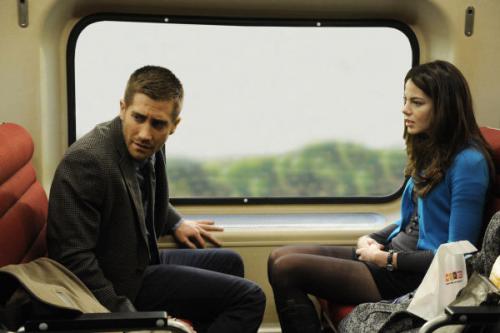
The greater current film, turning over to the art of the thriller – and I mean it’s a masterpiece – is Duncan Jones’ “Source Code.” I know, it sounds like I’m tipping past quantified criticism here. To me, it seems like serious film fanatics wouldn’t dare dream that another head-spinning thriller on par with “Memento” (2001) could possibly exist post-Christopher Nolan so then the door is shut on that possibility. As background on the  son of David Bowie, director Jones previously made the superbly brainy and bordering-on-schizophrenia mind-bender “Moon” (2009, pic right) with Sam Rockwell. His new film is the kind of pressure cooker, the kind of powerful situation-scenario that Hitchcock or John Carpenter could have made. Except Jones invests in an omnipresent looking-glass power, capturing an ominous feel, that is pinching in its claustrophobia. The hero is boxed-in on a non-stop 8-minute loop that varies each time in decision, action, and outcome. Indulgent Detour: Notable thrillers that come to mind where protagonists are trapped-in are “Quarantine” (2008), “The Mist” (2007), “Inside Man” (2006), “Dawn of the Dead” (2004), “ “Panic Room,” (2002), “Crimson Tide” (1995) “Speed” (1994), “Under Siege” (1992), “Runaway Train” (1985), “The Thing” (1982), “The Shining” (1980), “Assault on Precinct 13” (1976), “Alien” (1979), “Coma” (1978) “Straw Dogs” (1971), “Rosemary’s Baby” (1968) and “Repulsion” (1965).
son of David Bowie, director Jones previously made the superbly brainy and bordering-on-schizophrenia mind-bender “Moon” (2009, pic right) with Sam Rockwell. His new film is the kind of pressure cooker, the kind of powerful situation-scenario that Hitchcock or John Carpenter could have made. Except Jones invests in an omnipresent looking-glass power, capturing an ominous feel, that is pinching in its claustrophobia. The hero is boxed-in on a non-stop 8-minute loop that varies each time in decision, action, and outcome. Indulgent Detour: Notable thrillers that come to mind where protagonists are trapped-in are “Quarantine” (2008), “The Mist” (2007), “Inside Man” (2006), “Dawn of the Dead” (2004), “ “Panic Room,” (2002), “Crimson Tide” (1995) “Speed” (1994), “Under Siege” (1992), “Runaway Train” (1985), “The Thing” (1982), “The Shining” (1980), “Assault on Precinct 13” (1976), “Alien” (1979), “Coma” (1978) “Straw Dogs” (1971), “Rosemary’s Baby” (1968) and “Repulsion” (1965).
I haven’t yet met anybody that hasn’t immensely enjoyed “Source Code” but I’ll administer for a moment to those who might think the resolution is too pat and expedient in ways that the old classics weren’t. Because actually many “classics” by Hitchcock did yield to 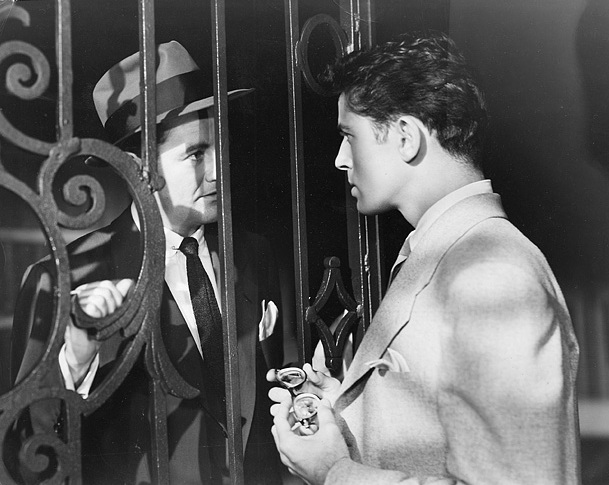 coincidental conclusions. I never understood, as groundbreaking as “Psycho” (1960) was, why Hitchcock built a film replete of sudden shocks and malice, only to without warning, climax it with a clipped final struggle that could have been avoided had Norman Bates not hesitated or turned his back or heard the footsteps behind him. “Shadows of a Doubt” (1943), “Rope” (1948), “Strangers on a Train” (1951, pic right), “Dial M for Murder” (1954), “To Catch a Thief” (1955) and “Frenzy” (1972) all would have had victorious villains had they not made careless errors in the final reel. Yet there is nothing wrong with those movies either because, come now, isn’t life full of accidental coincidences? A triumph of a thriller like “Source Code” deserves big-screen absorption. And to me it’s more solid and narratively air-tight, as well as thematically riskier, than most of Hitchcock’s renown titles. I stick by my high praise.
coincidental conclusions. I never understood, as groundbreaking as “Psycho” (1960) was, why Hitchcock built a film replete of sudden shocks and malice, only to without warning, climax it with a clipped final struggle that could have been avoided had Norman Bates not hesitated or turned his back or heard the footsteps behind him. “Shadows of a Doubt” (1943), “Rope” (1948), “Strangers on a Train” (1951, pic right), “Dial M for Murder” (1954), “To Catch a Thief” (1955) and “Frenzy” (1972) all would have had victorious villains had they not made careless errors in the final reel. Yet there is nothing wrong with those movies either because, come now, isn’t life full of accidental coincidences? A triumph of a thriller like “Source Code” deserves big-screen absorption. And to me it’s more solid and narratively air-tight, as well as thematically riskier, than most of Hitchcock’s renown titles. I stick by my high praise.
I droop disappointingly over the idea that people reserve their big-screen attendance for scriptless Bruce Willis vehicles, creatively bankrupt vampire dope-athons, carbon copy alien invasion assembly line product, and F/X robot smash ’em ups. Expertly crafted thrillers and original concept horror freakathons get the runt. I ask why? Reviews exist for a reason, even if you have to read multiple web reviews to get persuaded. To find a collection of critics who proverbially announce, “Hey, here’s something that’s actually new and exciting.” Because aren’t original visions what people ask for? When those releases actually do come it seems like once-optimistic film fanatics turn a blind eye.
Peculiarly, I went through defense of horror films first before I got to thrillers in this article. I think I chose this because horror films are often treated as dog s*** and so a stronger defense of excellent work has to be made first there. Horror films such as the ones I mentioned are sometimes in bad taste but they are not made by worthless untalented basta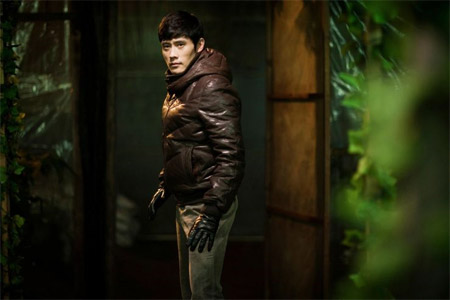 rds. And some of the best films this year have been thrillers as they continue to outweigh artistically everything else: Begin with “Source Code,” “I Saw the Devil” (South Korea, pic right), “Limitless,” “Black Death,” “Hanna.” Of course, I won’t get too ahead of myself. “Sucker Punch” and “The Rite” are for dumpsville.
rds. And some of the best films this year have been thrillers as they continue to outweigh artistically everything else: Begin with “Source Code,” “I Saw the Devil” (South Korea, pic right), “Limitless,” “Black Death,” “Hanna.” Of course, I won’t get too ahead of myself. “Sucker Punch” and “The Rite” are for dumpsville.
Nevertheless, 2011 could be the year of the thriller.




